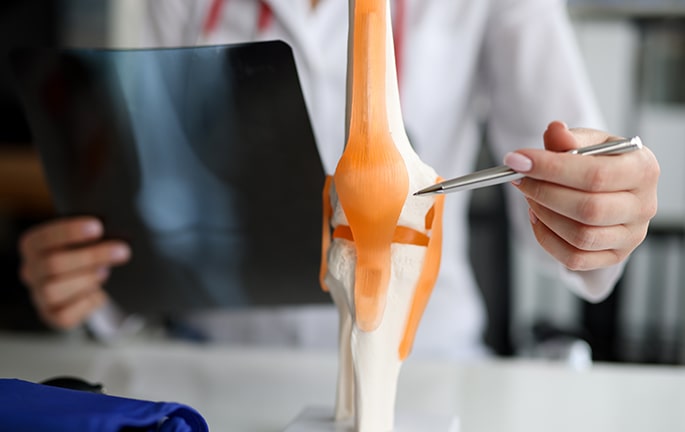Rheumatology
Learn about rheumatology and its field of study. We explain the main diseases it treats, the different diagnostic methods and treatments it uses, the most significant symptoms of rheumatic diseases, and what a consultation consists of. Schedule your appointment at one of our hospitals.

What is rheumatology?
The medical specialty responsible for the prevention, diagnosis, and treatment of musculoskeletal diseases is known as rheumatology. This discipline focuses on non-traumatic conditions that do not require surgical intervention. In most cases, these ailments are chronic, so rheumatologists establish a close relationship with their patients to help them maintain an optimal quality of life.
What does rheumatology study?
Rheumatology studies the diseases that affect the bones, muscles, joints, tendons, and ligaments, in short, the musculoskeletal system. The rheumatologists at Quirónsalud are specialized in specific areas to provide a quick and accurate diagnosis, as well as an effective treatment adapted to each patient’s particularities:
- Inflammatory diseases: due to an alteration in the immune system, the joints become inflamed and, as a result, gradually wear down.
- Degenerative diseases: the bones wear down over time, limiting movement and increasing pain.
- Bone metabolic diseases: include systemic diseases that alter the function of bone cells and affect their metabolism.
Who are the patients treated?
Rheumatic disorders can manifest at any point in life, so rheumatologists treat patients of all ages who present changes in the musculoskeletal system, including systemic autoimmune diseases. When the patients are children, in addition to diagnosis and treatment, this specialty ensures that their development is not affected by the disease.
Techniques, procedures, and diagnostic methods
Medical and technological advances allow rheumatologists to use a wide variety of diagnostic methods and treatments that improve the quality of life of patients affected by rheumatic diseases:
- Biological treatment: pharmacological therapy aimed at the immune system, used to reduce joint inflammation.
- Magnetic resonance imaging (MRI): diagnostic imaging method that allows the state of bones and joints to be visualized.
- Computed tomography (CT scan): diagnostic test through which images of bones and potential calcifications are obtained.
- Bone densitometry: test that analyzes the mineral levels in bones, especially calcium, and is used to diagnose osteoporosis.
- • Orthopantomography: panoramic X-ray used to obtain a complete image of the oral cavity and detect possible changes in the bones that make it up.
Diseases and symptoms
Main diseases and conditions
Among the most common rheumatic diseases are:
- Fibromyalgia
- Osteoarthritis
- Rheumatoid arthritis
- Sciatica
- Osteoporosis
- Ankylosing spondylitis
- Lumbago
- Rheumatism
- Gout
- Chondrocalcinosis
- Systemic lupus erythematosus (SLE)
- Polymyositis
Related symptoms
The main warning symptoms related to rheumatic diseases are:
About the rheumatology consultation
We solve any doubts you may have before you see the specialist
During the first consultation, the rheumatologist gathers all the necessary information to make an accurate diagnosis. For this, they ask the patient about their medical history, family background, and the symptoms they have experienced. Once this part is completed, a physical examination is conducted, and it is determined whether additional tests are needed.
What should you keep in mind?
Sometimes, it is unclear when to visit a rheumatologist, so many patients only go for consultation when they experience pain. To facilitate early diagnosis, it is important to make an appointment when joint inflammation occurs, when mobility limitations are perceived, or when deformities in the bones are noticed.
What should I bring to the consultation?
The more information the specialist has, the better. Therefore, it is advisable to attend the visit with a detailed list of symptoms and medications being taken, as well as a family history of rheumatic diseases and any prior medical reports.

If you have any further questions, please contact us through the Patient Services telephone number: 900 301 013




























































